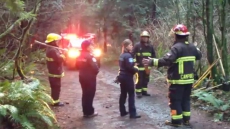Photos of three smiling, blond sisters circulated around the world this year after they were killed on their family farm in west-central Alberta.
Catie Bott, 13, and 11-year-old twins Dara and Jana, suffocated in a truck loaded with canola as their family was busy bringing in the harvest in October.
Glen Blahey with the Canadian Agricultural Safety Association says the tragedy has acted as a catalyst for discussing child safety on farms.
"I think it is making a difference in terms of recognition of hazards," he told The Canadian Press.
But he's hoping for more.
Blahey said it's great to talk about safety, but "it would be really nice to spur some action before a tragic event occurs."
The Alberta government recently released statistics showing that there were eight other farm deaths in 2015, two of them children. One was 10-year-old Joseph Stahl, who was driving a forklift on a Hutterite colony when the machine toppled into a ditch and pinned him underneath.
There were other child deaths on farms across the country. In one case in southwestern Saskatchewan, Layne Langridge, 14, fell in a truck loaded with grain. His grandfather, 66-year-old Dennis Becker, tried to save him. They both died.
Statistics from Canadian Agricultural Injury Reporting show that between 2000 and 2008, there were about 10 child farm deaths each year in Canada. The average before that was 16.
Jennifer Austin with 4-H Canada said the most recent deaths, especially of the Bott sisters, have deeply touched her organization. It is starting a new fund in 2016 to develop additional safety programs.
"We know clubs are already focused on farm safety but this will put a further emphasis on farm safety — and at a time when it's very much on the minds of people in rural communities," she said.
A few weeks ago, the NDP government in Alberta passed new legislation that puts farm and ranch workers under occupational health and safety rules. It became the last province to do so.
The law also gives workers' compensation benefits to paid farm workers injured on the job.
Following angry protests, the province clarified that family farms are exempt. The rules will only apply to paid workers.
Eric Musekamp, founder of the Farmworkers Union of Alberta, had pushed for the legislation for years. Although the law doesn't directly apply to kids on family farms, he's glad it will help paid child workers in larger farm operations.
He said he saw children as young as eight working in unsafe conditions when he was a truck driver a dozen years ago.
"There's chains and belts and electrical motors, wires, and trucks backing around and stuff. It's hair raising."
He said he once passed out safety supplies to children at a farm — masks, goggles and ear plugs — and was promptly fired.
"That kind of got my dander up," recalled Musekamp. That's why he formed the advocacy group.
He believes the solution to curbing injuries and deaths on farms is to create a training society similar to AgSafe in British Columbia. That group, funded through workers' compensation premiums, facilitates compliance of farm legislation through training and on-site visits, even to family farms.
Other provinces such as Manitoba and Ontario have similar societies, but Musekamp said the one in B.C. is more extensive.
Over the last 20 years, the group has significantly reduced farm fatalities and injuries in the province, he said. "They hardly ever have child fatalities in their industry anymore."
He describes farm safety legislation as a stick, and the training society as a carrot.
"We believe that's part of the success in reducing deaths and injuries on the family farm without employees. This training becomes ubiquitous ... In a relatively short period of time, it starts to change the culture."




